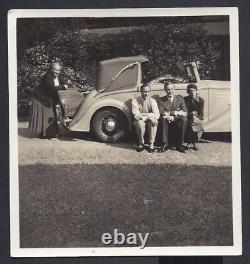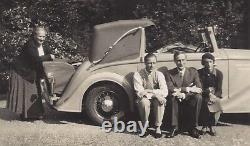Antique Imperial Russian Photo Prince Princess Yusupov Prince Nikita Romanov Car




Bibelotslondon Ltd is a UK registered company based in London Bridge dealing in ephemera and curiosities from Britain and around the world. Our diverse inventory is carefully chosen and constantly evolving. We work very hard to offer the highest quality works at competitive prices. Our inventory is listed online, and we strive to keep our website completely up to date, so our customers can easily check availability. We believe in offering clients items that are unique and rare for aficionados of the antique and collector's world. Bibelot is a late nineteenth century word derived from the French word bel'beautiful', meaning a small item of beauty, curiosity or interest. The word ephemera is derived from the sixteenth century Greek word ephmera meaning a printed or hand written paper not meant to be retained for a long period of time.
Fine antique private family snapshot photo of (Left to Right), Sophie. Cottage whilst visiting Grand Duchess Xenia. Of Russia at Frogmore Cottage.
From the collection of Prince and Princess Felix Yusupov. Felix was a Russian aristocrat, prince and count from the Yusupov family, best known for participating in the assassination of Grigori Rasputin. He was born in the Moika Palace in Saint Petersburg, the capital of the Russian Empire. His father was Count Felix Felixovich Sumarokov-Elston, the son of Count Felix Nikolaievich Sumarokov-Elston.
Zinaida Yusupova, his mother, was the last of the Yusupov line, of Crimean Tatar origin, and very wealthy. For the Yusupov name not to die out, his father was granted the title and the surname of his wife, Princess Zenaida Nikolaievna Yusupova upon their marriage. The Yusupov family, richer than any of the Romanovs, had acquired their wealth generations earlier. It included four palaces in Petrograd (St Petersburg), three palaces in Moscow, 37 estates in different parts of Russia (Kursk, Voronezh and Poltava), coal and iron-ore mines, plants and factories, flour mills and oil fields on the Caspian Sea.
When World War I broke out in August 1914, both were briefly detained in Berlin. Irina asked her relative, Crown Princess Cecilie of Prussia, to intervene with her father-in-law, Kaiser Wilhelm II. The Kaiser refused to permit the Yusupov family to leave but offered them a choice of three country estates to live in for the duration of the war.
Felix's father appealed to the Spanish ambassador in Germany and won permission for them to return to Russia via neutral Denmark to the Grand Duchy of Finland and from there to Saint Petersburg. The Yusupovs' only daughter, Princess Irina Felixovna Yusupova, nicknamed Bébé, was born on 21 March 1915. Bébé was largely raised by her paternal grandparents until she was nine. She was very spoiled by them. Her unstable upbringing caused her to become "capricious, " according to Felix. Felix and Irina, raised mainly by nannies themselves, were ill-suited to take on the day-to-day burdens of child-rearing. Bebe adored her father but had a more distant relationship with her mother.After the death of his brother, Felix was the heir to an immense fortune. The losses at the Eastern Front were enormous, and so Felix converted a wing of the Moika Palace into a hospital for wounded soldiers. Felix was able to avoid entering military service himself by taking advantage of a law exempting only-sons from serving. Irina's first cousin, Grand Duchess Olga, to whom she had been close when they were girls, was disdainful of Felix: "Felix is a'downright civilian,' dressed all in brown, walked to and fro about the room, searching in some bookcases with magazines and virtually doing nothing; an utterly unpleasant impression he makes - a man idling in such times, " Olga wrote to Nicholas on 5 March 1915 after paying a visit to the Yusupovs. In February 1916 Felix began studies at the elite Page Corps military academy and tried joining a regiment in August.
Yusupov's plan, as he described it in his book, was to seek closer acquaintance with the healer Grigori Rasputin, and win his confidence. He asked Rasputin to cure a slight malady from which he suffered. Yusupov first approached the lawyer Vasily Maklakov, who agreed to advise Felix. Yusopov then approached Sergei Mikhailovich Sukhotin, an army officer in the Preobrazhensky Regiment who was recovering from injuries who was a friend of his mother.
Grand Duke Dmitri received Yusupov's suggestion with alacrity, and his alliance was welcomed as indicating that the murder would not be a demonstration against the [Romanov] dynasty. On the night of 29/30 December (NS) 1916, Felix, Dmitri, Vladimir Purishkevich, assistant Stanilaus de Lazovert and Sukhotin killed Rasputin in the Moika Palace. A major reconstruction of the palace had almost been finished, with a small room in the basement carefully furnished. For some time, Yusupov lived in a mansion owned by Grand Duchess Xenia Alexandrovna of Russia, his mother-in-law. Rasputin was hit by a bullet that entered his left chest and penetrated the stomach and the liver; a second entered the left back soon after the first and penetrated the kidneys.
The wounds were serious, and Rasputin would have died in 10-20 min, but he succeeded in escaping, only to fall in the snow-clad courtyard. It is not clear if Rasputin was beaten by Yusupov with a sort of dumb bell and if it was Purishkevich who shot him in the forehead. The conspirators finally threw the corpse from Bolshoy Petrovsky Bridge into an ice hole in the Malaya Neva. On the Empress's orders, a police investigation commenced and traces of blood were discovered on the steps to the back door of the Yusupov Palace. Prince Felix attempted to explain the blood with a story that one of his favourite dogs was shot accidentally by Grand Duke Dmitri.
Yusupov and Dmitri were placed under house arrest in the Sergei Palace. The upper levels of the palace were occupied by the British embassy and the Anglo-Russian Hospital.The Empress had refused to meet the two but said that they could explain what had happened in a letter to her. She wanted both shot immediately, but she was persuaded to back off from the idea. Without a trial, the Tsar sent Dmitri to the front in Persia; Purishkevich was already on his way to the front in Romania. The Tsar banished Yusupov to his estate in Rakitnoye, in Belgorod Oblast.
One week after the February Revolution, Nicholas abdicated the throne on 2 March. The paintings were bought by Joseph E. Widener in 1921 and are now in the National Gallery in Washington, DC.In Crimea, the family boarded a British warship, HMS Marlborough, which took them from Yalta to Malta. One of the British officers noted that Irina appeared shy and retiring at first, but it was only necessary to take a little notice of her pretty, small daughter to break through her reserve and discover that she was also very charming and spoke fluent English. From Malta, they travelled to Italy and then to Paris.
In Paris, they stayed a few days in Hôtel de Vendôme before they went on to London. In 1932, he and his wife successfully sued MGM in the English courts for invasion of privacy and libel in connection with the film Rasputin and the Empress.
The alleged libel was not that the character based on Felix had committed murder but that the character based on Irina, called "Princess Natasha" in the film, was portrayed as having been seduced by the lecherous Rasputin. She condemned both men as murderers and said any decent person would be disgusted by the ferocity of Rasputin's killing. [36] Maria's claim was dismissed. The French court ruled that it had no jurisdiction over a political killing that had occurred in Russia. Irina and Felix enjoyed a happy and successful marriage for more than 50 years. When Felix died in 1967, Irina was stricken by grief and died three years later. He was buried in Sainte-Geneviève-des-Bois Russian Cemetery, in the southern suburbs of Paris.Princess irina was the only daughter and eldest child of Grand Duke Alexander Mikhailovich of Russia and Grand Duchess Xenia Alexandrovna of Russia. She was also the only niece of Tsar Nicholas II of Russia, and the wife of the wealthiest man in Imperial Russia.
Before her marriage on 22 February 1914, Irina, the eldest child and only daughter in a family of seven children, was considered one of the most eligible women in Imperial Russia. Her family had spent long periods living in the south of France beginning in about 1906 because of her father's political disagreements with the Tsar. [1] Her father was also carrying on an affair with a woman in the south of France and often asked Xenia for a divorce, which she refused to grant him. Xenia enjoyed extramarital affairs as well.
Irina's parents tried to hide their unhappy marriage from their seven children, and Irina, a shy and tongue-tied girl with deep blue eyes and dark hair, had a happy childhood. Irina was often called Irène, the French version of her name, or Irene, the English version. Her mother sometimes nicknamed her Baby Rina. The Romanovs, heavily influenced by the French and English, spoke French better than Russian and often used the foreign versions of their first names to refer to each other. Irina was given away by her uncle, Nicholas II, and his wedding present to her was a bag of 29 uncut diamonds, ranging from three to seven carats.
Irina and Felix also received a large assortment of precious gems from other wedding guests. They later managed to take many of these gems out of the country following the Russian Revolution of 1917 to use them to provide a living in exile. Felix and Irina's only daughter, Princess Irina Felixovna Yusupova, nicknamed "Bebé", was born on 21 March 1915. "I shall never forget my happiness when I heard the child's first cry, " her father wrote. Irina liked her name and wanted to pass it on to her first child.
Prince Rostislav was the fifth son and sixth child of Grand Duke Alexander Mikhailovich and Grand Duchess Xenia Alexandrovna. He was a nephew of Tsar Nicholas II, Russia's last tsar. During the Russian Revolution Prince Rostislav was imprisoned along with his parents and grandmother the Dowager Empress at Dulber, in the Crimea. He escaped the fate of a number of his Romanov cousins who were murdered by the Bolsheviks when he was freed by German troops in 1918.
Size: 8.5 x 9.5 cm approx. Photos form part of the description.
This item is in the category "Collectables\Historical Memorabilia\Royalty Collectables". The seller is "bibelotslondon" and is located in this country: GB.This item can be shipped worldwide.
- Country/Region of Manufacture: Russian Federation
- To Commemorate: Family Reunion
- Theme: Royalty
- Royal/ Reign: Non-UK Royalty
- Type: Photos
- Year: 1920s
- Features: Antique
- Vintage: Yes
- Royal: Tsar Nicholas II
- Royalty: Russian Royalty

